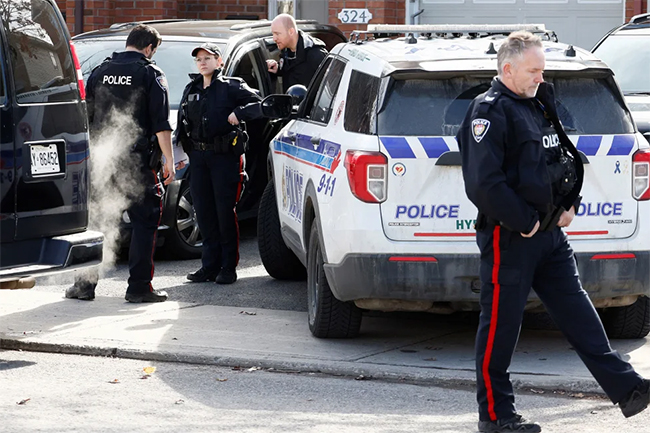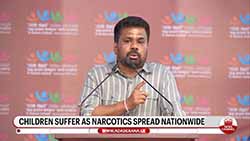Sri Lankan family’s killing: Confusion, errors marred Ottawa Police communications
March 12, 2024 08:14 pm
Ottawa police admit they made mistakes last week when communicating key information about the city’s worst mass killing in recent history.
Six people, including a mother, her four young children and a family acquaintance, were found dead inside a townhouse in the south Ottawa suburb of Barrhaven on March 6. The woman’s husband and father of the children remains in hospital.
A 19-year-old man who was living with the family is in custody facing six counts of first-degree murder and one count of attempted murder.
According to police, they began receiving calls at 10:52 p.m. Wednesday and responded minutes later. In court, prosecutors said the accused was in custody around 11 p.m.
The day after the tragedy, the Ottawa Police Service (OPS) called the killings a “mass shooting” when no guns were involved, repeatedly misspelled the victims’ names and misidentified the accused.
Chief referred to ‘mass shooting’
On Thursday morning during a live, nationally broadcast interview on CBC, OPS Chief Eric Stubbs mistakenly called the killings a “mass shooting.”
During a news conference that afternoon, Stubbs misidentified the man in custody as “Frank D’Souza.” Later that day Febrio De-Zoysa, a 19-year-old Sri Lankan national who had come to Canada as a student, was officially charged.
After the news conference on Thursday, OPS issued five separate emails to correct the victims’ names they’d provided earlier that day.
Their first attempt contained errors in three of the six names. The second email contained different errors in the same three names.
A third email corrected two names and the age of a victim. After CBC flagged more errors, OPS replied with yet another correction. Then, at 3 p.m., they issued a final version.
‘Quickly evolving’ investigation
In a statement to CBC, OPS admitted the mistakes and said homicides are “very complex files to investigate and quickly evolving.”
In the case of the Barrhaven killings, police said there were “multiple credible sources consulted in the collating of names, and some information we received was wrong,” OPS said.
“We also made mistakes when we communicated key information about the tragic deaths. That is an inherent risk of the fast paced and timely communications we strive to deliver to Ottawa residents.”
The statement said responding officers and investigators diligently collect information in a process involving contacting “multiple sources, including involved persons (victims/suspects), witnesses, family members and of course official government/databases.”
“Erroneous information is sometimes communicated to police and we can also make mistakes when communicating with the community and media,” OPS said. “When that happens, we correct it as soon as possible.”
Police communications ‘incredibly problematic’
Christopher Schneider, a professor of criminology at Brandon University in Manitoba, said communications by Ottawa police were “incredibly problematic” in this case.
“Often one’s competence is judged by their communicative performance,” Schneider said. “If the police are not communicating effectively through traditional media, social media, with the community, that leads to the public perception of police incompetence.”
That in turn “could possibly extend to an erosion of confidence and trust in policing,” he said.
Schneider said ineffective communication from police is magnified when it involves immigrant, refugee and racialized communities, including Indigenous ones.
“These community groups, they talk among themselves and they see this when it comes out in media, they see that the police are not effectively communicating in a tragic, outrageous circumstance like this,” he said.
“This leads to a continuing rotation and distrust in police and policing.”
Police facing ‘tremendous pressure’
Darryl Davies, a professor of criminology at Carleton University, said Ottawa police and other first responders would have faced “tremendous pressure” as they arrived at the crime scene.
“That probably contributed to the lack of information and consistency of information that subsequently came out,” Davies said, noting their priority would be locating victims and hunting for the suspect.
“They were probably, understandably, totally caught off guard, and the shock and the horror of witnessing something like that would have unbelievable ramifications on the individuals who are there.”
Davies said that trauma “probably more than anything overshadowed any consistency or communication to the public, because it would have just been so horrific.”
He said even officers prepared with the best possible training would face a “horrific challenge” just trying to process the information.
“The Ottawa police did the best they could under the circumstances, given the horrific nature of the events and how they unfolded.”
But Davies also said police need better training in communicating the details of such tragedies to the public.
“Police as a whole need to have people who are specialized in communications. I think they should be trained in how to deal with these situations,” he said.
Source: CBC
-Agencies












